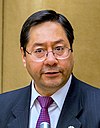Presidential election in Bolivia 2020
The presidential election in Bolivia 2020 took place on October 18, 2020. At the same time, elections were held for the upper and lower houses of the plurinational legislative assembly , the Bolivian parliament.
background
See also History of Bolivia
After the first round of the presidential election in Bolivia in 2019 , the previous president Evo Morales won , according to the electoral authority . The result was controversial and while Morales and his supporters celebrated the continuation of his "Cambio" policy, opponents of the government accused him of electoral fraud. International observers pointed out irregularities and spoke out in favor of a runoff election. Riots broke out in the country. The Bolivian military urged Morales to resign and Morales went into exile in Mexico. Jeanine Áñez ( MDS ) declared herself interim president, supported by conservative circles. Due to ongoing conflicts in the country, it was not possible to schedule the new elections at short notice. Then continuedCOVID-19 pandemic hit Bolivia . As a result, the election date was postponed several times by the fourth power of the Bolivian state, the election commission. After ongoing protests and road blockades, all sides finally agreed to really hold the election on October 18, 2020, regardless of the further development of the pandemic.
Candidates
Jeanine Áñez initially ran as a candidate herself, which repeatedly brought her allegations of abusing her position. It also became apparent that Carlos Mesa ( Frente Revolucionario de Izquierda ) would have better chances of winning. The candidate of the long-standing ruling party Movimiento al Socialismo , Luis Arce, would win if he achieved an approval rating of more than 40% and the next best candidate had a gap of 10%. Since all previous opposition parties positioned themselves as the opposite of the MAS, they take votes from each other and thus increase Arce's chances of victory.
The other well-known candidates include one of the leaders of the 2019 protest movement, Luis Fernando Camacho , and former President Jorge "Tuto" Quiroga . On October 11th, Quiroga announced that he was withdrawing his candidacy with the aim of reducing the likelihood of an outright MAS victory.
In the last polls before the election, Arce was 42.2% ahead of Mesa with 33.1% and Camacho with 16.7%, so that a decision in the first ballot appeared possible.
Preparation of the elections
On August 3rd, the final election calendar was presented by the election authority OEP. The campaign phase was set to run from September 6th to October 14th. Six possible scenarios were planned with regard to any necessary repetitions or a second ballot. November 14, 2020 has been set as the earliest date for the establishment of the new President and the other elected authorities.
213,600 randomly selected citizens were chosen as election workers in September and then prepared for their tasks via a web tutorial. A major focus was on avoiding the risk of infection from COVID-19.
The number of eligible voters is given as 7,332,925, of which 301,631 live abroad. In addition to Argentina , where 161,057 registered voters reside, ballot boxes are also set up in Germany , Switzerland and 31 other countries.
The arrival of the European Election Observation Mission was announced on September 18. Due to the polarization of the political camps, the government assigns it an important role in order to strengthen the population's confidence in the election result and to avoid renewed violent clashes. The Organization of American States (OAS / OEA), the Inter-American Association of Electoral Bodies UNIORE and the Carter Center are sending further missions .
election day
The course of election day was unanimously described by observers as peaceful and regulated. Only delays in the counting of votes after 5 p.m. caused some nervousness. Instead of starting at 8 p.m. as announced, the survey-based forecasts of two institutes were only published shortly after midnight. The reason given was that the given statistical reliability was difficult to achieve. Many respondents relied on voting secrecy and did not provide any information.
Contrary to the last polls before the election, which the MAS expected in the range of 40 to 43%, the first forecasts of around 53% foresee a clear victory in the first ballot. Jeanine Áñez congratulated the winners that night and called on them to govern with caution and not to endanger democracy.

